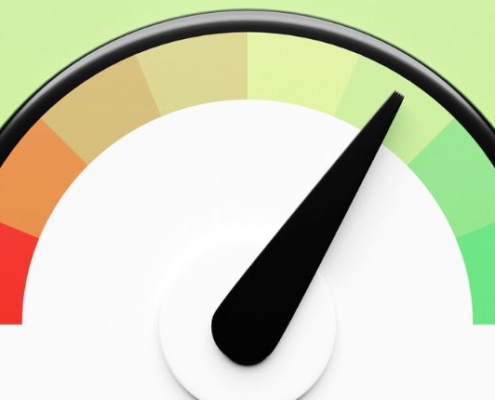The ROI of Marketing for Small Businesses: Measuring What Matters
February 25, 2025

By Blake Zahansky
Junior Account Executive
For small business owners, every dollar counts. That’s why understanding the return on investment (ROI) of your marketing efforts isn’t just helpful—it’s essential for sustainable growth and success.
Understanding Marketing ROI and Why It Matters More Than Ever for Small Businesses
Marketing ROI is a performance measure that evaluates the efficiency of your marketing investments. The formula is straightforward:
ROI (%) = [(Net Profit from Marketing – Marketing Investment) / Marketing Investment] × 100
While the calculation may be simple, the strategy behind maximizing that percentage requires a deeper understanding.
As a small business owner, you’re likely wearing multiple hats and juggling competing priorities – especially in today’s fast-changing and highly competitive environment. Measuring marketing ROI ensures that your limited budget is allocated strategically, focusing on campaigns that deliver tangible results. This approach not only maximizes profitability but also helps you identify underperforming strategies that may need adjustment.
The Challenges of Accurate Measurement
Measuring marketing ROI can be challenging due to several factors:
- Attribution Complexity: Determining which marketing efforts directly contribute to sales can be difficult, especially when multiple campaigns run simultaneously.
- Long-Term vs. Short-Term Effects: Some marketing activities, like brand building, may not yield immediate sales but are vital for long-term success.
- Data Limitations: Small businesses often lack the tools or expertise to collect and analyze comprehensive marketing data.
Strategies for Measuring Marketing ROI
To overcome these challenges, we recommend implementing these strategic approaches:
- Set Clear Objectives: Define specific, measurable goals for each marketing campaign that align with your customers’ needs and behaviors. For example, increasing website traffic by 20% or generating 50 new qualified leads per month.
- Utilize Digital Analytics Tools: Leverage tools like Google Analytics to track user behavior, conversion rates, and other key performance indicators (KPIs) that reveal how customers interact with your brand.
- Implement Unique Tracking Mechanisms: Use unique promo codes, dedicated landing pages, or customized URLs to trace the source of leads and sales accurately.
- Adopt Advanced Analytical Methods: Consider marketing mix modeling (MMM) to quantify the impact of various marketing activities on sales, helping to optimize future strategies.
- Conduct Customer Surveys: Gather feedback to understand how customers discovered your business and which marketing channels influenced their decision-making—building relationships through understanding.
The Digital Marketing Advantage
Digital marketing is typically the most efficient way for small businesses to attract new customers because it allows for a very targeted spend to specific audiences. It includes channels such as:
- Websites
- Social media
- Email marketing
- Digital advertising
- SEO and content marketing
In addition to offering the most efficient marketing spend for small business advertising, digital marketing offers another big advantage – the ability to collect data on the performance of different campaign visuals, messages, and targeting. That’s something you can’t typically do with non-digital advertising. So while non-digital forms of marketing are still important to your overall campaign mix, digital marketing can be leveraged to inform and refine both your creative and your strategy overall.
Essential Tools and KPIs for Effective ROI Measurement
Different marketing objectives require different measurement approaches. Understanding which KPIs to track based on your campaign goals is crucial for accurate ROI assessment:
For Awareness Marketing:
- Reach and impressions
- Website traffic and new visitors
- Social media engagement rates
- Share of voice compared to competitors
- Brand recall and recognition metrics
For Conversion-Focused Marketing:
- Conversion rates
- Cost per acquisition
- Lead quality scores
- Sales cycle length
- Customer lifetime value (CLV)
Implementing the right measurement tools can streamline this process and provide more accurate insights:
- Google Analytics: Essential for tracking website performance, user behavior, and conversion paths.
- Automated Dashboards: Tools like DashThis, Databox, or Google Data Studio can consolidate metrics from multiple channels for at-a-glance performance monitoring.
- CRM Integration: Connect your marketing activities with sales outcomes by integrating your CRM system with your marketing platforms.
- UTM Parameters: Use these tracking codes consistently across campaigns to clearly identify traffic sources.
By focusing on the right metrics and utilizing these measurement tools, you’ll gain clearer visibility into your marketing performance, allowing for data-driven decisions that maximize your ROI.
Ready to Fuel Your Success?
If you’ve got questions about measuring the ROI of your own marketing efforts or would like help setting up the measurement systems and tools shared here, get in touch.
We can help you to better measure what matters, and we also offer a variety of flexible, affordably-priced small business marketing packages to help ensure that the metrics you’re measuring are the numbers you want to see.
AI may have been utilized for the initial research and drafting of this content.










